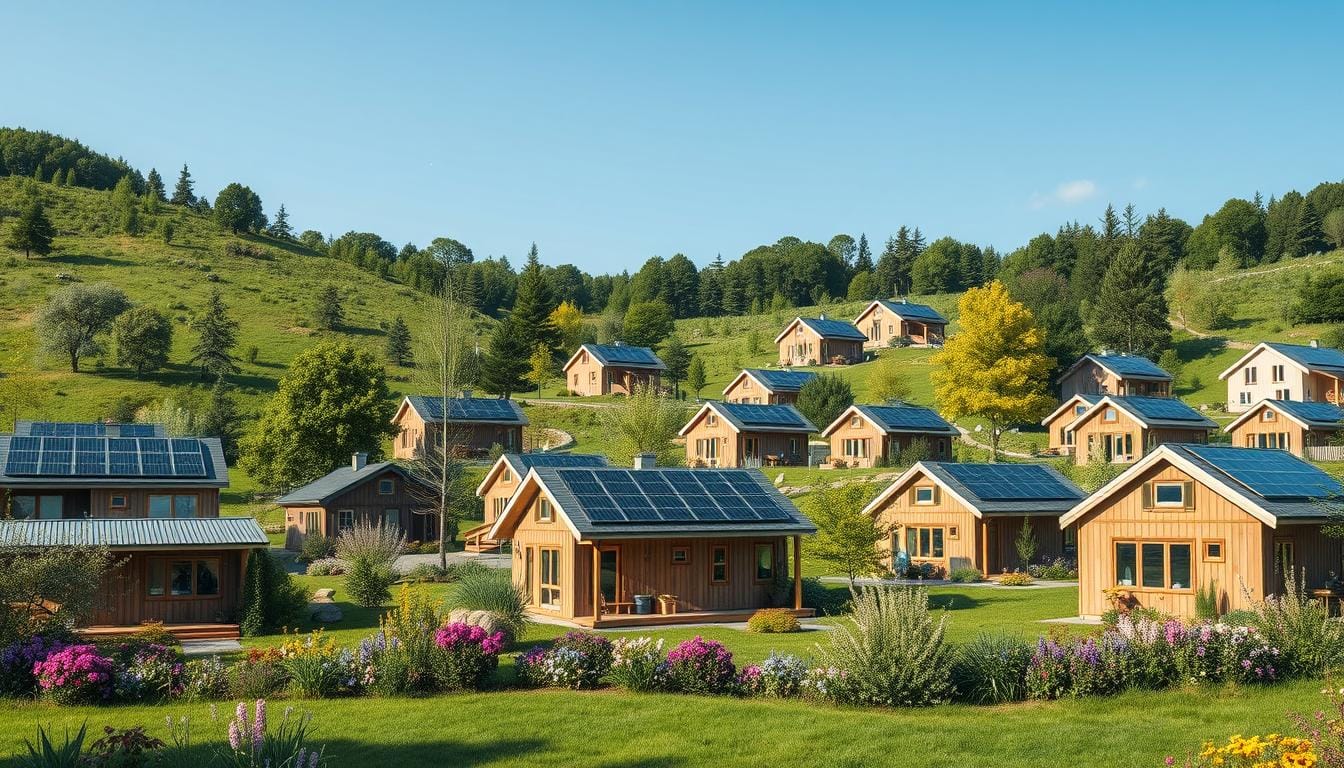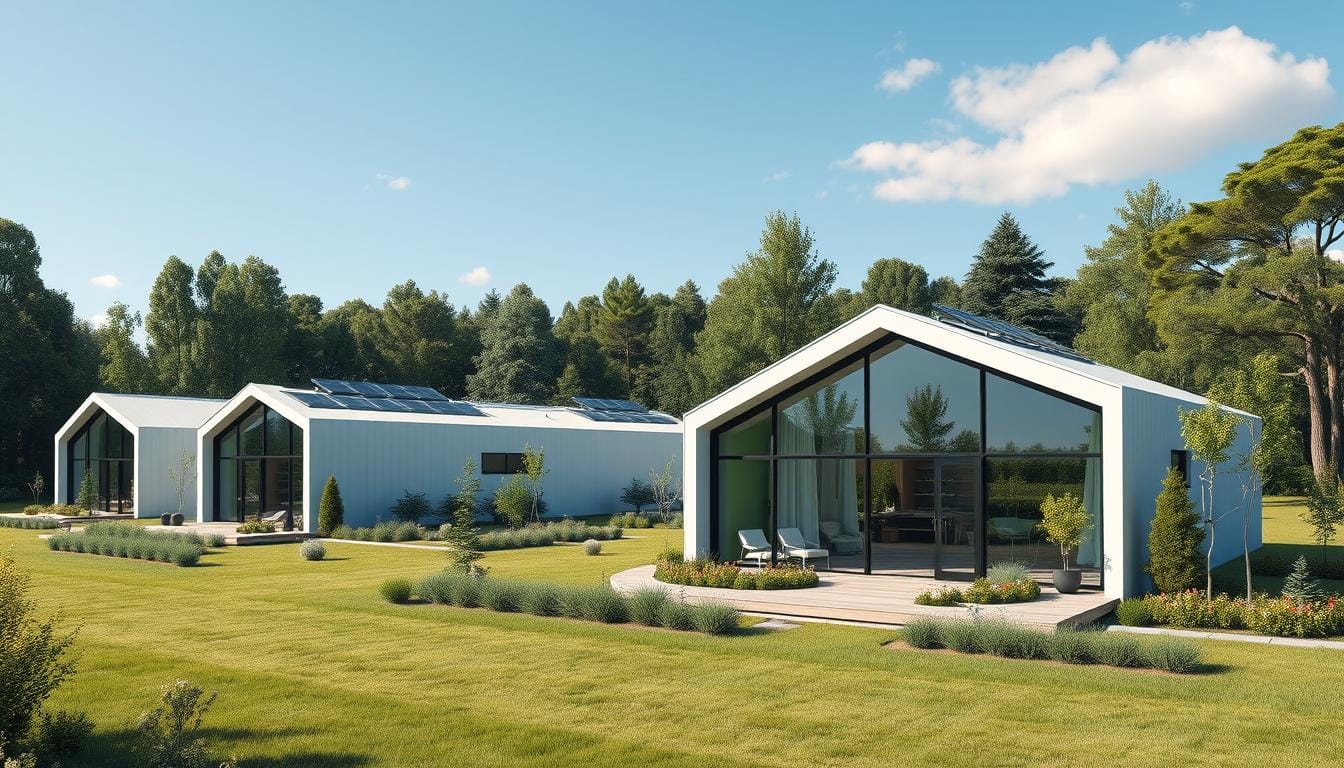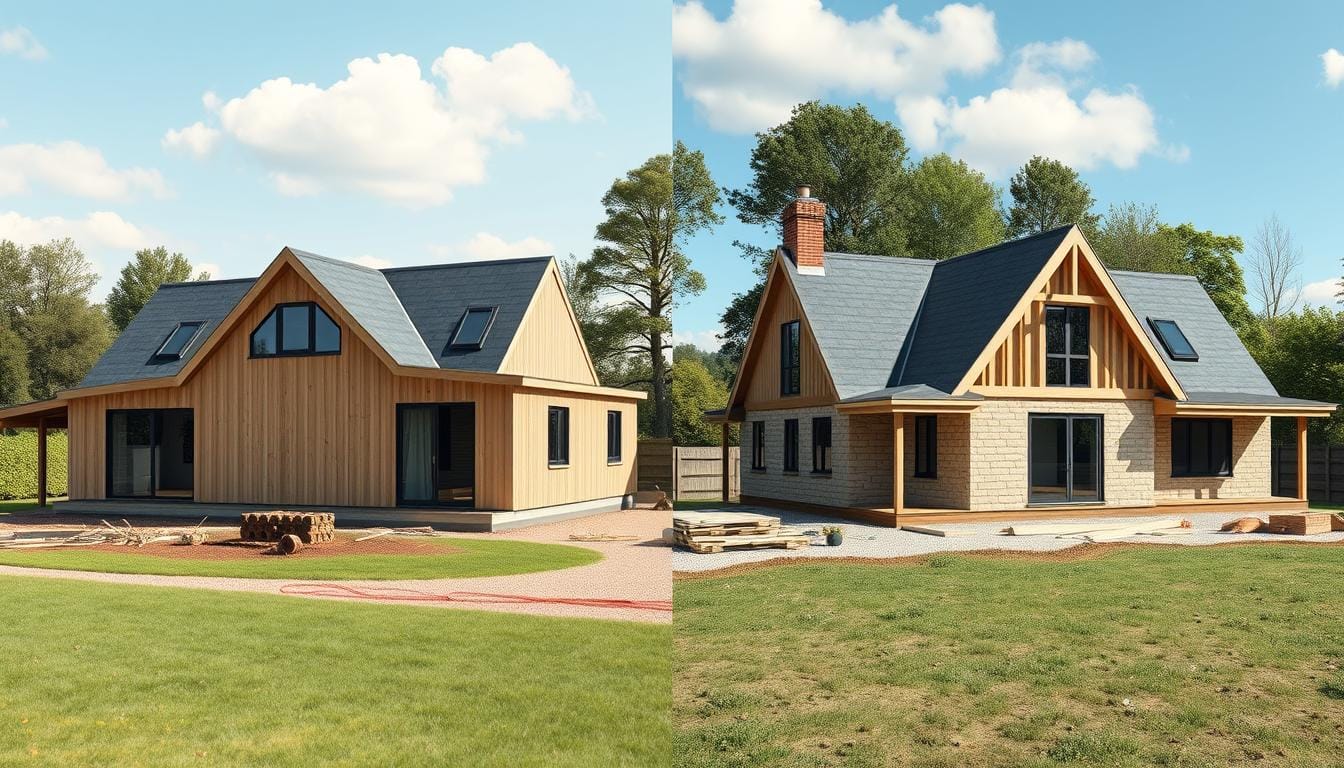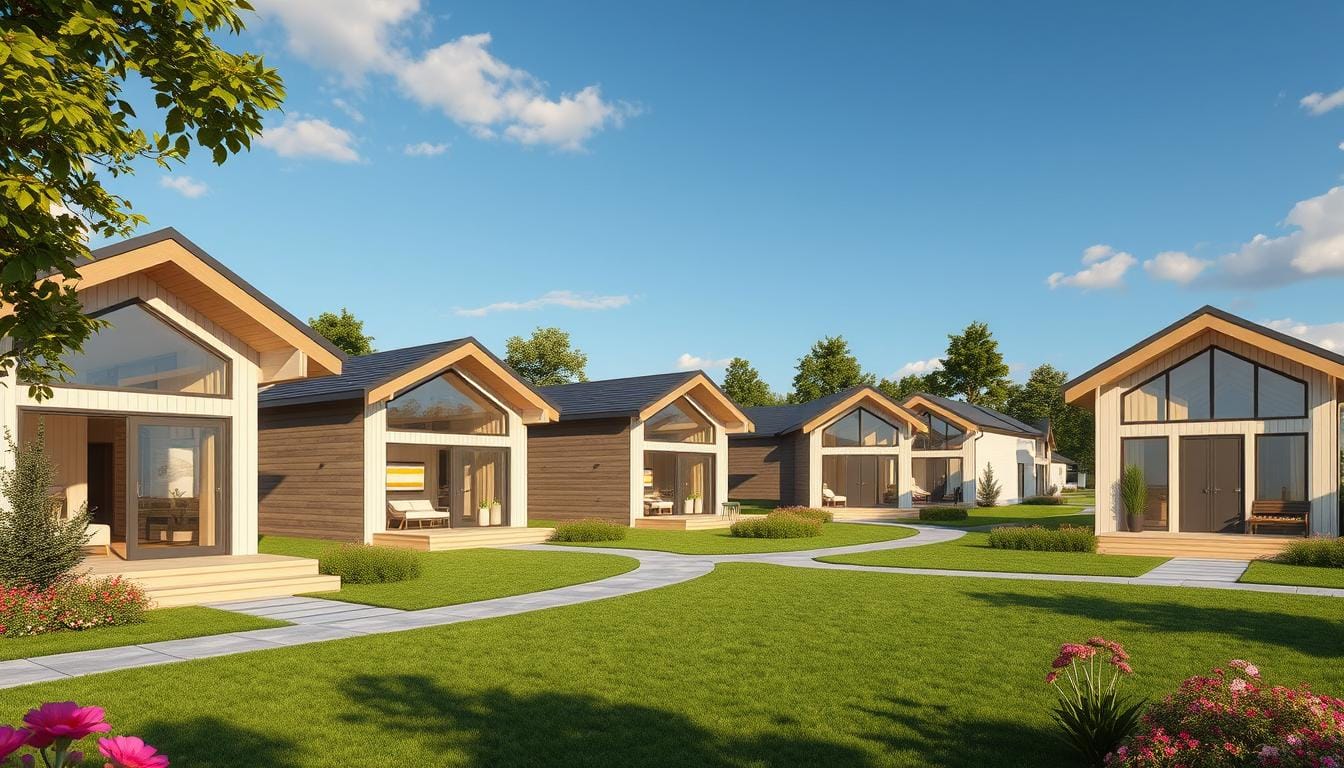Many people wonder about free modular homes. These homes are known for being fast to build and save energy. But, they do have costs for making and building them. In the UK and other places, getting a free modular home has not been possible because of these costs.
But, there are efforts to make affordable modular homes more available. This is true in places where new funding ideas or government help are used to solve housing problems. The goal is to offer sustainable prefab homes without the usual costs. But, are these homes really free? Let’s explore this interesting topic further.
Key Takeaways
- Modular homes offer quick assembly and energy efficiency.
- The initial costs for these homes remain substantial due to manufacturing and construction expenses.
- Innovative funding and government aid play a key role in making modular housing more accessible.
- Real-world examples show how modular solutions can help with homelessness.
- It’s important to understand the trade-offs of free modular homes for those who might benefit.
Understanding Modular Homes
Modular homes are changing the housing world with their precise factory build and green practices. They are built in a factory and then moved to be put together. This method offers a flexible choice, from small homes to big ones for families.
What Are Modular Homes?
Modular homes are built in a factory, not on-site like usual homes. This way, they waste less and are more efficient. It lets people design their homes exactly how they want, with custom modular home design and new ideas in architecture.
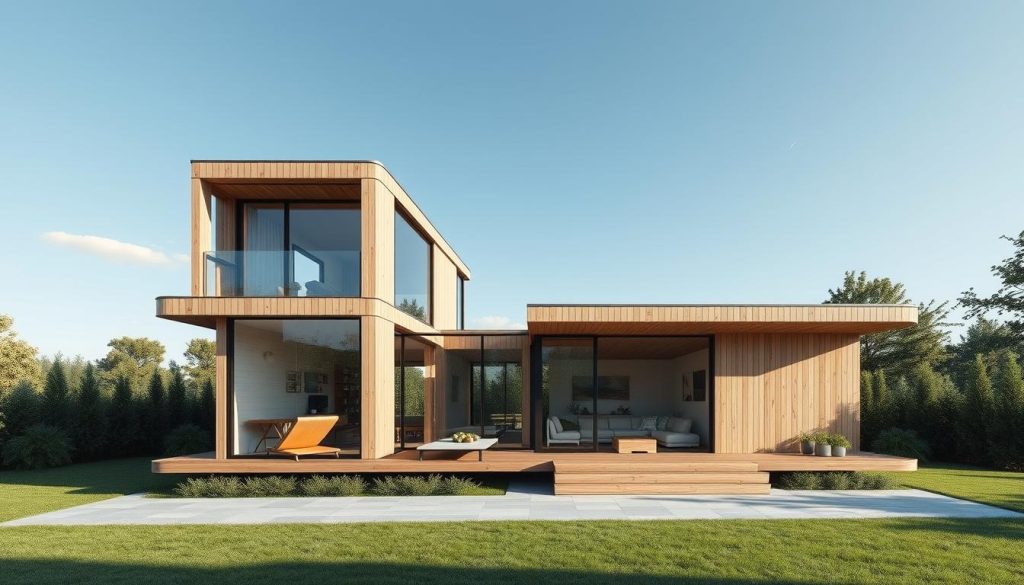
Big names like Mini Living and Blu Homes are leading in this field. Mini Living makes homes that are affordable, green, and easy to move. Blu Homes creates high-end homes that are built in a factory and then moved to their site.
Benefits of Modular Homes
Modular homes have many good points. They are built fast, much quicker than regular homes. This means you save a lot of time.
They also save money on bills because they are built to be energy-smart. Companies use green materials and new tech to make these homes.
- Lower overall cost per square foot
- Reduced construction time
- Minimised waste
- High-quality control measures
- Sustainability through innovative building methods
Structural Insulated Panels (SIPs) in modular homes help the environment. They make these homes strong and green. Modular homes are built to the same standard everywhere, following local rules.
Modular homes are getting attention for solving housing problems fast and in an eco-friendly way. They offer a solution for affordable and green homes.
The Concept of Free Modular Homes
Off-grid modular homes are getting more popular. The idea of “free” homes is tempting, but they’re mostly a dream. Yet, new ways to fund homes are making affordable modular housing a reality.
Are They Truly Free?
Modular homes aren’t completely free. But, there are plans to make sustainable prefab homes more affordable. Building a modular home costs between £300 and £1,500 per square meter. This is much cheaper than traditional homes.
Even so, “free” usually means heavily subsidised. Or, it’s financed through creative schemes.
“Around 15,000 modular homes are constructed per year in the UK, showing a big demand for this affordable housing.”

Potential Funding Options
There are new ways to pay for modular homes:
- Government Grants and Subsidies: Grants can make prefab homes cheaper. UK government projects, like tackling homelessness, often use modular homes. This is because they’re affordable and quick to build.
- Communal Projects: Community projects use modular homes to save money. They pool funds to make buying a home easier.
- Non-profit Organisations: Charities and non-profits are funding homes for the vulnerable. They use outside money to cover costs fully or partly.
Financing can also depend on how long a modular home lasts. Lenders want to know it will last at least 60 years. Despite this, modular homes are attractive because they’re built faster than traditional ones.
Find out more about financing and the benefits of modular homes. The UK is seeing more support for these homes from government and financial groups.
Government Schemes and Assistance
The UK government is working hard to make homes more affordable. They have launched many initiatives to help with this. These include grants, subsidies, and local council projects. They aim to solve the housing shortage and promote green building.
Available Grants and Subsidies
The government has set aside £3 billion for a loan fund. This fund will help build 20,000 affordable homes. They also plan to add £6 billion more to support housing providers with low-cost loans.
This money is to make homes more affordable and accessible. It’s a big step towards solving the housing crisis.
- The Affordable Homes Guarantee Scheme has delivered 6,290 new homes so far. They plan to build many more.
- Watford Community Housing has built 200 homes and plans to add 100 more.
- Energy-efficient upgrades, like solar panels, are often funded. This can save tenants a lot on energy bills.
The government is investing £10 billion in housing. The Affordable Homes Programme is worth £11.5 billion. It aims to bring in £38 billion in private investment for sustainable housing.
Local Council Initiatives
Local councils play a big role in housing schemes. They work with developers to meet community needs. They focus on green building to reduce carbon emissions and save energy.

- Local councils can get loans up to £250 million for site preparation and infrastructure.
- They also support town centre regeneration and public space revitalisation through joint ventures.
The Home Building Fund offers loans from £250,000 to small builders. This helps diversify the housing market. It supports builders with plans for five or more homes.
Local councils’ involvement ensures modular housing fits regional plans. Their efforts help meet the goal of building 1 million homes and 300,000 annually.
The Pros and Cons of Free Modular Homes
Free modular homes offer both benefits and challenges. It’s important to know these points if you’re thinking about joining a modular home community. Or if you’re interested in free modular housing solutions.
Advantages of Free Modular Homes
Modular homes have many advantages, including being cost-effective. They are made quickly and with less waste. This makes them cheaper than traditional houses.
They are also good for the environment. Modular homes meet strict standards for energy efficiency. This means they use less energy and are better for the planet.
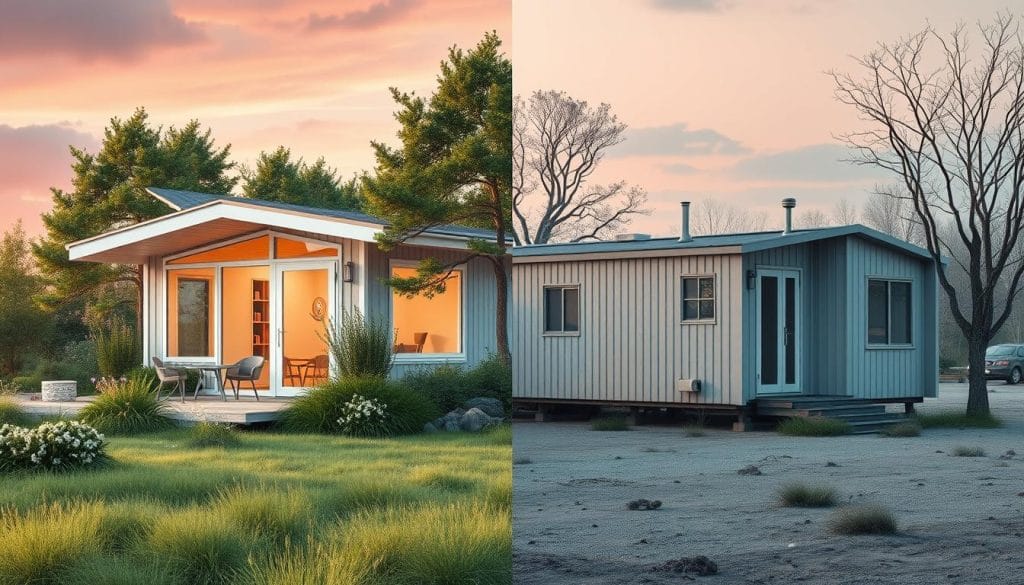
Modular homes are also very flexible. You can change their layout or add rooms easily. They hold their value well, thanks to their modern construction.
Disadvantages and Challenges
But, there are also challenges with modular homes. Making them free is hard because of money issues. It’s hard to find ways to fund free homes.
Some people might not think prefabricated homes are good enough. This can make it hard to get people to accept them. We need to work on changing these views.
There are also practical problems. Moving the homes can be tricky because of size and weight limits. And setting up the homes on-site can cost extra.
Getting a loan for a modular home can be tough. Some banks won’t lend until the home is built. This makes it hard for new buyers to get into a modular home.
In conclusion, free modular homes are attractive but come with big challenges. Knowing these points helps people decide if modular homes are right for them.
Conclusion: Is a Free Modular Home Feasible?
The idea of a completely free modular home is hard to grasp. While fully free homes might not be possible, homes at a lower cost are within reach. Modular homes cost between $100 and $200 per square foot, making them affordable.
Final Thoughts
Even if a fully “free” home is not possible, there are ways to make it cheaper. Government grants and subsidies can help a lot. Modular homes are also flexible and good for the environment.
They meet today’s standards for being green and healthy. The cost can vary based on where you are and how custom you want it. This makes modular homes fit different needs.
Future of Modular Housing in the UK
The future of modular homes in the UK is bright. New technology and a focus on the environment are making them more popular. They could change how we live in the UK for the better.
Using green materials and smart tech makes them even more appealing. As more people choose modular homes, they will become a big part of the UK’s housing market.
If you want to learn more about modular homes, check out our detailed insights on modular homes in Nottingham. See how they are changing communities.

